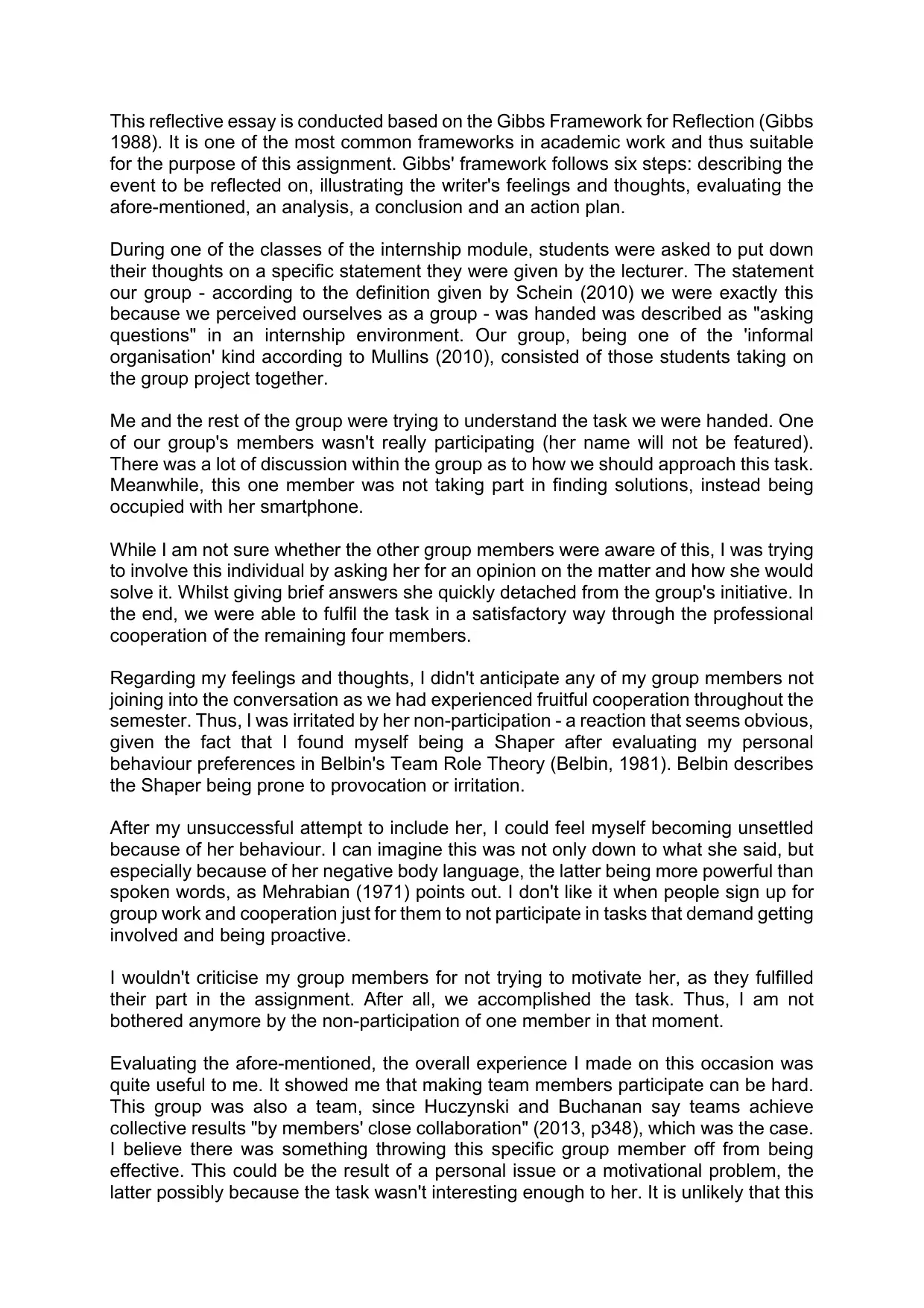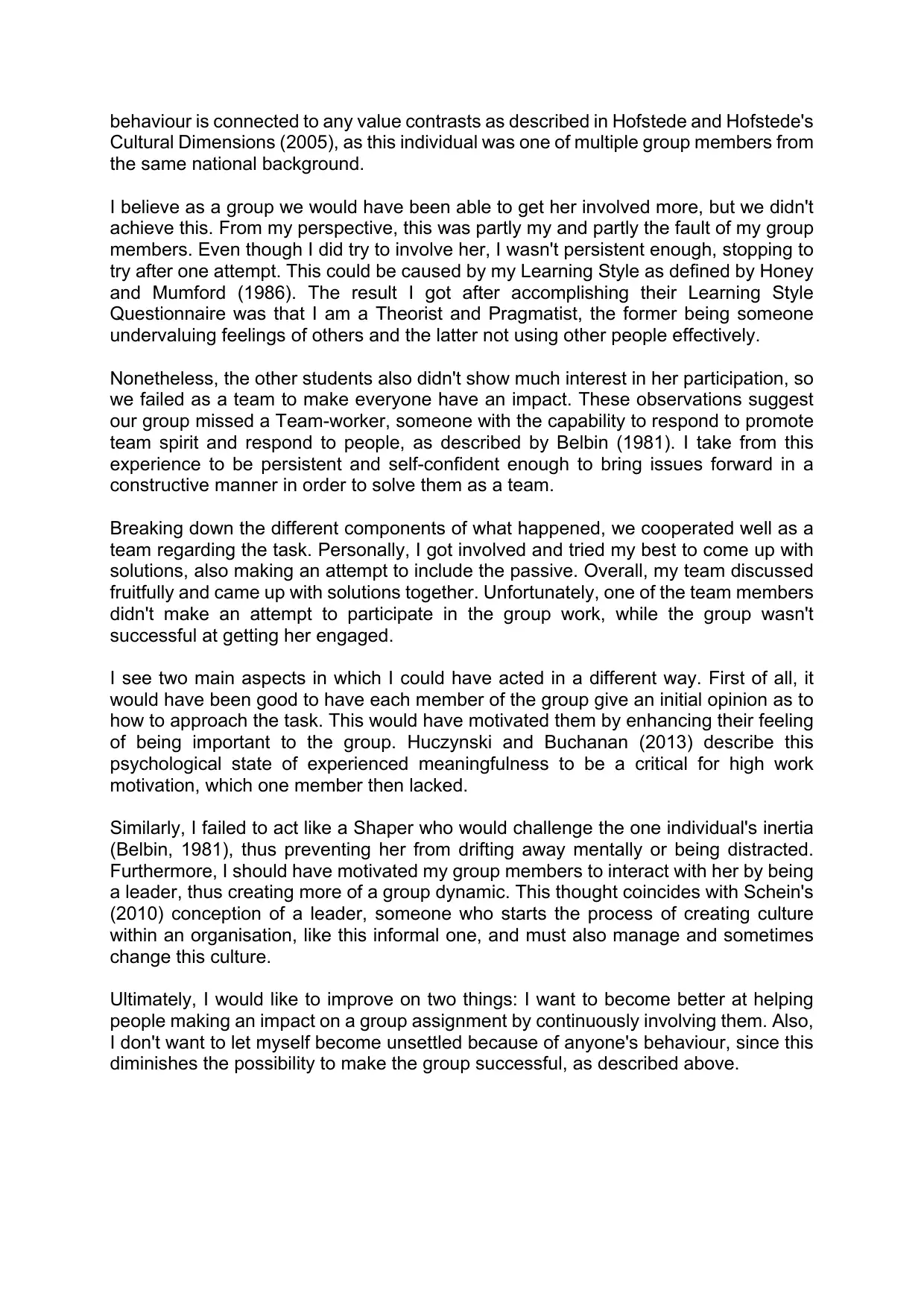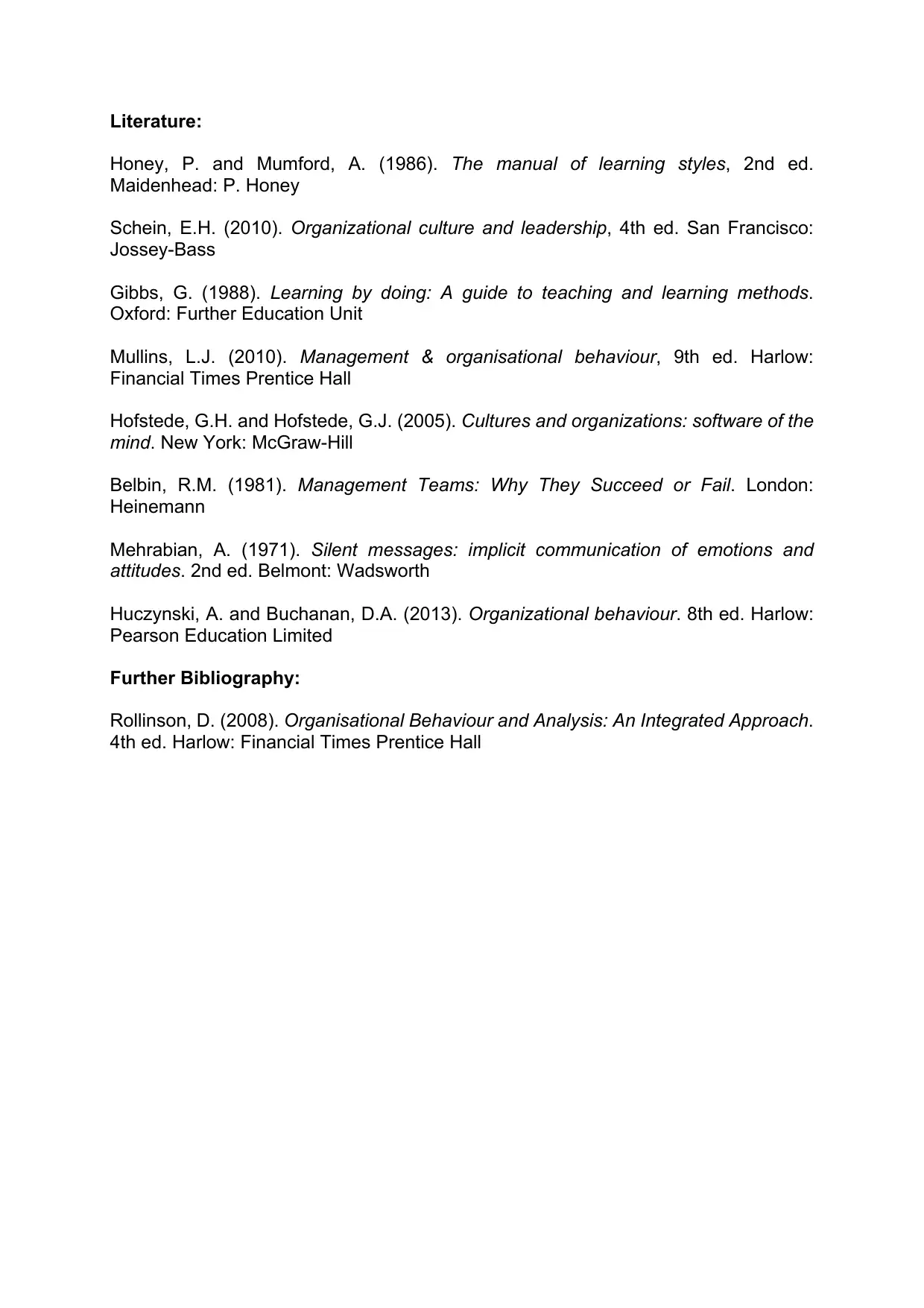Reflective Essay on Internship Module: Group Dynamics and Leadership
VerifiedAdded on 2021/02/24
|3
|1441
|585
Essay
AI Summary
This reflective essay, structured around the Gibbs Framework, analyzes a group project experience during an internship module. The essay describes a scenario where one group member's lack of participation created challenges. The author reflects on their feelings of irritation, evaluates the situation using Belbin's Team Role Theory, and analyzes the dynamics of the group, identifying missed opportunities for better teamwork. The reflection highlights the importance of persistence, self-confidence, and leadership in fostering team member engagement. The essay references various academic sources to support the analysis. The author concludes with an action plan for improving their approach to group work and leadership in future projects, aiming to enhance team dynamics and ensure all members contribute effectively.

This reflective essay is conducted based on the Gibbs Framework for Reflection (Gibbs
1988). It is one of the most common frameworks in academic work and thus suitable
for the purpose of this assignment. Gibbs' framework follows six steps: describing the
event to be reflected on, illustrating the writer's feelings and thoughts, evaluating the
afore-mentioned, an analysis, a conclusion and an action plan.
During one of the classes of the internship module, students were asked to put down
their thoughts on a specific statement they were given by the lecturer. The statement
our group - according to the definition given by Schein (2010) we were exactly this
because we perceived ourselves as a group - was handed was described as "asking
questions" in an internship environment. Our group, being one of the 'informal
organisation' kind according to Mullins (2010), consisted of those students taking on
the group project together.
Me and the rest of the group were trying to understand the task we were handed. One
of our group's members wasn't really participating (her name will not be featured).
There was a lot of discussion within the group as to how we should approach this task.
Meanwhile, this one member was not taking part in finding solutions, instead being
occupied with her smartphone.
While I am not sure whether the other group members were aware of this, I was trying
to involve this individual by asking her for an opinion on the matter and how she would
solve it. Whilst giving brief answers she quickly detached from the group's initiative. In
the end, we were able to fulfil the task in a satisfactory way through the professional
cooperation of the remaining four members.
Regarding my feelings and thoughts, I didn't anticipate any of my group members not
joining into the conversation as we had experienced fruitful cooperation throughout the
semester. Thus, I was irritated by her non-participation - a reaction that seems obvious,
given the fact that I found myself being a Shaper after evaluating my personal
behaviour preferences in Belbin's Team Role Theory (Belbin, 1981). Belbin describes
the Shaper being prone to provocation or irritation.
After my unsuccessful attempt to include her, I could feel myself becoming unsettled
because of her behaviour. I can imagine this was not only down to what she said, but
especially because of her negative body language, the latter being more powerful than
spoken words, as Mehrabian (1971) points out. I don't like it when people sign up for
group work and cooperation just for them to not participate in tasks that demand getting
involved and being proactive.
I wouldn't criticise my group members for not trying to motivate her, as they fulfilled
their part in the assignment. After all, we accomplished the task. Thus, I am not
bothered anymore by the non-participation of one member in that moment.
Evaluating the afore-mentioned, the overall experience I made on this occasion was
quite useful to me. It showed me that making team members participate can be hard.
This group was also a team, since Huczynski and Buchanan say teams achieve
collective results "by members' close collaboration" (2013, p348), which was the case.
I believe there was something throwing this specific group member off from being
effective. This could be the result of a personal issue or a motivational problem, the
latter possibly because the task wasn't interesting enough to her. It is unlikely that this
1988). It is one of the most common frameworks in academic work and thus suitable
for the purpose of this assignment. Gibbs' framework follows six steps: describing the
event to be reflected on, illustrating the writer's feelings and thoughts, evaluating the
afore-mentioned, an analysis, a conclusion and an action plan.
During one of the classes of the internship module, students were asked to put down
their thoughts on a specific statement they were given by the lecturer. The statement
our group - according to the definition given by Schein (2010) we were exactly this
because we perceived ourselves as a group - was handed was described as "asking
questions" in an internship environment. Our group, being one of the 'informal
organisation' kind according to Mullins (2010), consisted of those students taking on
the group project together.
Me and the rest of the group were trying to understand the task we were handed. One
of our group's members wasn't really participating (her name will not be featured).
There was a lot of discussion within the group as to how we should approach this task.
Meanwhile, this one member was not taking part in finding solutions, instead being
occupied with her smartphone.
While I am not sure whether the other group members were aware of this, I was trying
to involve this individual by asking her for an opinion on the matter and how she would
solve it. Whilst giving brief answers she quickly detached from the group's initiative. In
the end, we were able to fulfil the task in a satisfactory way through the professional
cooperation of the remaining four members.
Regarding my feelings and thoughts, I didn't anticipate any of my group members not
joining into the conversation as we had experienced fruitful cooperation throughout the
semester. Thus, I was irritated by her non-participation - a reaction that seems obvious,
given the fact that I found myself being a Shaper after evaluating my personal
behaviour preferences in Belbin's Team Role Theory (Belbin, 1981). Belbin describes
the Shaper being prone to provocation or irritation.
After my unsuccessful attempt to include her, I could feel myself becoming unsettled
because of her behaviour. I can imagine this was not only down to what she said, but
especially because of her negative body language, the latter being more powerful than
spoken words, as Mehrabian (1971) points out. I don't like it when people sign up for
group work and cooperation just for them to not participate in tasks that demand getting
involved and being proactive.
I wouldn't criticise my group members for not trying to motivate her, as they fulfilled
their part in the assignment. After all, we accomplished the task. Thus, I am not
bothered anymore by the non-participation of one member in that moment.
Evaluating the afore-mentioned, the overall experience I made on this occasion was
quite useful to me. It showed me that making team members participate can be hard.
This group was also a team, since Huczynski and Buchanan say teams achieve
collective results "by members' close collaboration" (2013, p348), which was the case.
I believe there was something throwing this specific group member off from being
effective. This could be the result of a personal issue or a motivational problem, the
latter possibly because the task wasn't interesting enough to her. It is unlikely that this
Paraphrase This Document
Need a fresh take? Get an instant paraphrase of this document with our AI Paraphraser

behaviour is connected to any value contrasts as described in Hofstede and Hofstede's
Cultural Dimensions (2005), as this individual was one of multiple group members from
the same national background.
I believe as a group we would have been able to get her involved more, but we didn't
achieve this. From my perspective, this was partly my and partly the fault of my group
members. Even though I did try to involve her, I wasn't persistent enough, stopping to
try after one attempt. This could be caused by my Learning Style as defined by Honey
and Mumford (1986). The result I got after accomplishing their Learning Style
Questionnaire was that I am a Theorist and Pragmatist, the former being someone
undervaluing feelings of others and the latter not using other people effectively.
Nonetheless, the other students also didn't show much interest in her participation, so
we failed as a team to make everyone have an impact. These observations suggest
our group missed a Team-worker, someone with the capability to respond to promote
team spirit and respond to people, as described by Belbin (1981). I take from this
experience to be persistent and self-confident enough to bring issues forward in a
constructive manner in order to solve them as a team.
Breaking down the different components of what happened, we cooperated well as a
team regarding the task. Personally, I got involved and tried my best to come up with
solutions, also making an attempt to include the passive. Overall, my team discussed
fruitfully and came up with solutions together. Unfortunately, one of the team members
didn't make an attempt to participate in the group work, while the group wasn't
successful at getting her engaged.
I see two main aspects in which I could have acted in a different way. First of all, it
would have been good to have each member of the group give an initial opinion as to
how to approach the task. This would have motivated them by enhancing their feeling
of being important to the group. Huczynski and Buchanan (2013) describe this
psychological state of experienced meaningfulness to be a critical for high work
motivation, which one member then lacked.
Similarly, I failed to act like a Shaper who would challenge the one individual's inertia
(Belbin, 1981), thus preventing her from drifting away mentally or being distracted.
Furthermore, I should have motivated my group members to interact with her by being
a leader, thus creating more of a group dynamic. This thought coincides with Schein's
(2010) conception of a leader, someone who starts the process of creating culture
within an organisation, like this informal one, and must also manage and sometimes
change this culture.
Ultimately, I would like to improve on two things: I want to become better at helping
people making an impact on a group assignment by continuously involving them. Also,
I don't want to let myself become unsettled because of anyone's behaviour, since this
diminishes the possibility to make the group successful, as described above.
Cultural Dimensions (2005), as this individual was one of multiple group members from
the same national background.
I believe as a group we would have been able to get her involved more, but we didn't
achieve this. From my perspective, this was partly my and partly the fault of my group
members. Even though I did try to involve her, I wasn't persistent enough, stopping to
try after one attempt. This could be caused by my Learning Style as defined by Honey
and Mumford (1986). The result I got after accomplishing their Learning Style
Questionnaire was that I am a Theorist and Pragmatist, the former being someone
undervaluing feelings of others and the latter not using other people effectively.
Nonetheless, the other students also didn't show much interest in her participation, so
we failed as a team to make everyone have an impact. These observations suggest
our group missed a Team-worker, someone with the capability to respond to promote
team spirit and respond to people, as described by Belbin (1981). I take from this
experience to be persistent and self-confident enough to bring issues forward in a
constructive manner in order to solve them as a team.
Breaking down the different components of what happened, we cooperated well as a
team regarding the task. Personally, I got involved and tried my best to come up with
solutions, also making an attempt to include the passive. Overall, my team discussed
fruitfully and came up with solutions together. Unfortunately, one of the team members
didn't make an attempt to participate in the group work, while the group wasn't
successful at getting her engaged.
I see two main aspects in which I could have acted in a different way. First of all, it
would have been good to have each member of the group give an initial opinion as to
how to approach the task. This would have motivated them by enhancing their feeling
of being important to the group. Huczynski and Buchanan (2013) describe this
psychological state of experienced meaningfulness to be a critical for high work
motivation, which one member then lacked.
Similarly, I failed to act like a Shaper who would challenge the one individual's inertia
(Belbin, 1981), thus preventing her from drifting away mentally or being distracted.
Furthermore, I should have motivated my group members to interact with her by being
a leader, thus creating more of a group dynamic. This thought coincides with Schein's
(2010) conception of a leader, someone who starts the process of creating culture
within an organisation, like this informal one, and must also manage and sometimes
change this culture.
Ultimately, I would like to improve on two things: I want to become better at helping
people making an impact on a group assignment by continuously involving them. Also,
I don't want to let myself become unsettled because of anyone's behaviour, since this
diminishes the possibility to make the group successful, as described above.

Literature:
Honey, P. and Mumford, A. (1986). The manual of learning styles, 2nd ed.
Maidenhead: P. Honey
Schein, E.H. (2010). Organizational culture and leadership, 4th ed. San Francisco:
Jossey-Bass
Gibbs, G. (1988). Learning by doing: A guide to teaching and learning methods.
Oxford: Further Education Unit
Mullins, L.J. (2010). Management & organisational behaviour, 9th ed. Harlow:
Financial Times Prentice Hall
Hofstede, G.H. and Hofstede, G.J. (2005). Cultures and organizations: software of the
mind. New York: McGraw-Hill
Belbin, R.M. (1981). Management Teams: Why They Succeed or Fail. London:
Heinemann
Mehrabian, A. (1971). Silent messages: implicit communication of emotions and
attitudes. 2nd ed. Belmont: Wadsworth
Huczynski, A. and Buchanan, D.A. (2013). Organizational behaviour. 8th ed. Harlow:
Pearson Education Limited
Further Bibliography:
Rollinson, D. (2008). Organisational Behaviour and Analysis: An Integrated Approach.
4th ed. Harlow: Financial Times Prentice Hall
Honey, P. and Mumford, A. (1986). The manual of learning styles, 2nd ed.
Maidenhead: P. Honey
Schein, E.H. (2010). Organizational culture and leadership, 4th ed. San Francisco:
Jossey-Bass
Gibbs, G. (1988). Learning by doing: A guide to teaching and learning methods.
Oxford: Further Education Unit
Mullins, L.J. (2010). Management & organisational behaviour, 9th ed. Harlow:
Financial Times Prentice Hall
Hofstede, G.H. and Hofstede, G.J. (2005). Cultures and organizations: software of the
mind. New York: McGraw-Hill
Belbin, R.M. (1981). Management Teams: Why They Succeed or Fail. London:
Heinemann
Mehrabian, A. (1971). Silent messages: implicit communication of emotions and
attitudes. 2nd ed. Belmont: Wadsworth
Huczynski, A. and Buchanan, D.A. (2013). Organizational behaviour. 8th ed. Harlow:
Pearson Education Limited
Further Bibliography:
Rollinson, D. (2008). Organisational Behaviour and Analysis: An Integrated Approach.
4th ed. Harlow: Financial Times Prentice Hall
⊘ This is a preview!⊘
Do you want full access?
Subscribe today to unlock all pages.

Trusted by 1+ million students worldwide
1 out of 3
Related Documents
Your All-in-One AI-Powered Toolkit for Academic Success.
+13062052269
info@desklib.com
Available 24*7 on WhatsApp / Email
![[object Object]](/_next/static/media/star-bottom.7253800d.svg)
Unlock your academic potential
Copyright © 2020–2026 A2Z Services. All Rights Reserved. Developed and managed by ZUCOL.





